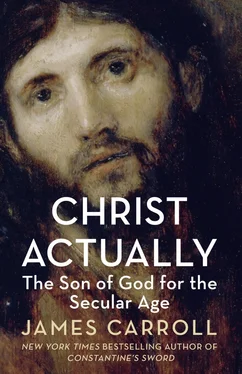The Gospel writers had what we might call a theological concern, but they were not doing theology. They had reference to received data from the past, but they were not doing history. The closest we can come to what those ancient authors were up to is simply to say that they were telling a story. Against all that is doctrinaire and historicist, the intuition that drives the present work is that the simple story of Jesus—whatever the history behind the story—offers a necessary structure of meaning, and perhaps even a mode of survival. Stories exist to be taken, first, at face value, even if, second, they demand to be read in light of theological reflection and historical criticism. Stories deserve to be thought about, yes—but mostly to be taken in.
So creeds, doctrines, and the scientific method of textual analysis all give expression to the meaning of the Gospel—but they are not the Gospel. The Gospel is the story. What this work is doing, between the brackets of theology and history, is returning to the story. We are doing so if only because, as story, the Gospel of Jesus Christ has braced the human imagination in a way far surpassing any other artistic or intellectual creation. Its meaning for culture, its primacy in Western civilization, would be enough. Yet more than culture is at stake here.
Culture, of course, shapes this inquiry—shapes me. I am a Catholic, informed by the Catholic tradition, but the enforcers of Catholic orthodoxy are not sitting on my shoulder. The only authority I assert is the authority of what I think. I make no claim to objectivity. Indeed, my entire point is subjective, however much the writing aims to be critically informed. The wonder of the way God works in history lies in the fact that the core proclamation of what’s called good news powerfully arises out of what is time-bound, as well as out of the thicket of failure so vividly on display in what precedes and follows. Human fallibility marks the story at hand as much in its first century as in its twenty-first.
But unlike the work of theologians and historians, this work also asks whether the story of Jesus should be the starting point at all. “Jesus is the answer” is scrawled on the walls of tenements and prison cells, but sometimes, just below it, one also reads the addendum “What is the question?” After Auschwitz and Hiroshima, the true gateposts of the Secular Age, the question is not the survival of belief as much as the survival of the human species itself. As this reflection begins in Dietrich Bonhoeffer’s cell, and in my own youthful faith, it will move through the harshest of challenges, including the unrelenting darkness of war and its resulting ideology of oppositionalism, to find a pragmatic way forward in the world as it is. The faith we seek, the Jesus Christ we aim to retrieve, is the key to a new meaning of redemption, which is, for the first time in history, nothing less than the literal possibility of a human future. We look again for Jesus Christ because we need a reason now for hope. The end of this book is not threat, but promise.
Конец ознакомительного фрагмента.
Текст предоставлен ООО «ЛитРес».
Прочитайте эту книгу целиком, купив полную легальную версию на ЛитРес.
Безопасно оплатить книгу можно банковской картой Visa, MasterCard, Maestro, со счета мобильного телефона, с платежного терминала, в салоне МТС или Связной, через PayPal, WebMoney, Яндекс.Деньги, QIWI Кошелек, бонусными картами или другим удобным Вам способом.












